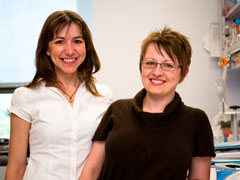Dropping In
By Laura Pratt
Patrycja Thompson makes a mean chicken tikka masala. Or she used to do, before her return to school robbed her of the time her stint in the workforce afforded for such indulgences.
Letting up on her hobbies is just one of the adjustments this second-year PhD student at Sunnybrook Research Institute (SRI) has had to make in her re-entry into academic life. "Going back to school was a big change," she says.
Thompson, who's a student in the lab of Dr. Juan Carlos Zúñiga-Pflücker, a senior scientist at SRI and a professor in immunology at the University of Toronto (U of T), is among those who have returned to school after spending time at a job. Negotiating the transition can be tricky and requires a correction in mindset.
But, say those who have crossed the divide, the effort pays off.
Thompson always knew she wanted to enter a PhD program, but was happy to take a break from school after finishing her master's degree in 2005. When her boyfriend (now husband) landed a job at the Vaccine and Infectious Disease Organization at the University of Saskatchewan, she followed. Soon after the pair landed in Saskatoon, Thompson also scored a job there, as a research technician.
Two years later, she left, she says, "because I felt I didn't develop much during that [period] and I wanted to do more with research." She began a PhD in immunology.
She now spends her days researching T cell development and is happy to be back in the land of academe, although she remembers her days as an employee fondly.
"Grad studies are gruelling," she says. "It's not a nine-to-five job. I went [into the workforce] because I wanted to have a normal life."
That normal life meant working 8 a.m. to 4 p.m. and, after work, meeting with friends, playing badminton, or perusing cookbooks and preparing something exotic at home. On the weekends, she and her partner would go camping or take road trips.
"It was more relaxed when I was employed. Now it's way more busy. I basically have no free time. It kind of bugs me," says Thompson.
And there are bigger sacrifices. With her decision to return, Thompson postponed plans to start a family. "If I'd stayed [in the workforce], I would be able to go on maternity leave. Here, I can't even fathom being pregnant or having a child."
Dzana Dervovic, who worked as a technician in the lab of Dr. Michael Ratcliffe, a senior scientist at SRI and the chair of immunology at U of T, for three years before re-enlisting as a student, knew that she wanted "to do something that would be worthwhile." Now in the fifth year of her PhD, where she studies notch signalling in T cell lineage, she says that student life means a greater mental commitment.
"At work, you close the door at the end of the day and forget about it. Plus, you're paid for it. Here, you take the work with you. Or you just think about it all the time."
Just the same, says Dervovic, who's now in Zúñiga-Pflücker's lab, the student life offers certain liberties. "Here, you have a freedom in that you're not so tied to the work; you have a freedom to do whatever you want."
Indeed, agrees Thompson, whose longer-range plans might include teaching. "Coming back to school is a way of achieving my goals. I know that, at the end of the program, I'll have the necessary skills to go on.
"I'm learning now and I enjoy it, even though it's hard at times."
PDF / View full media release »





